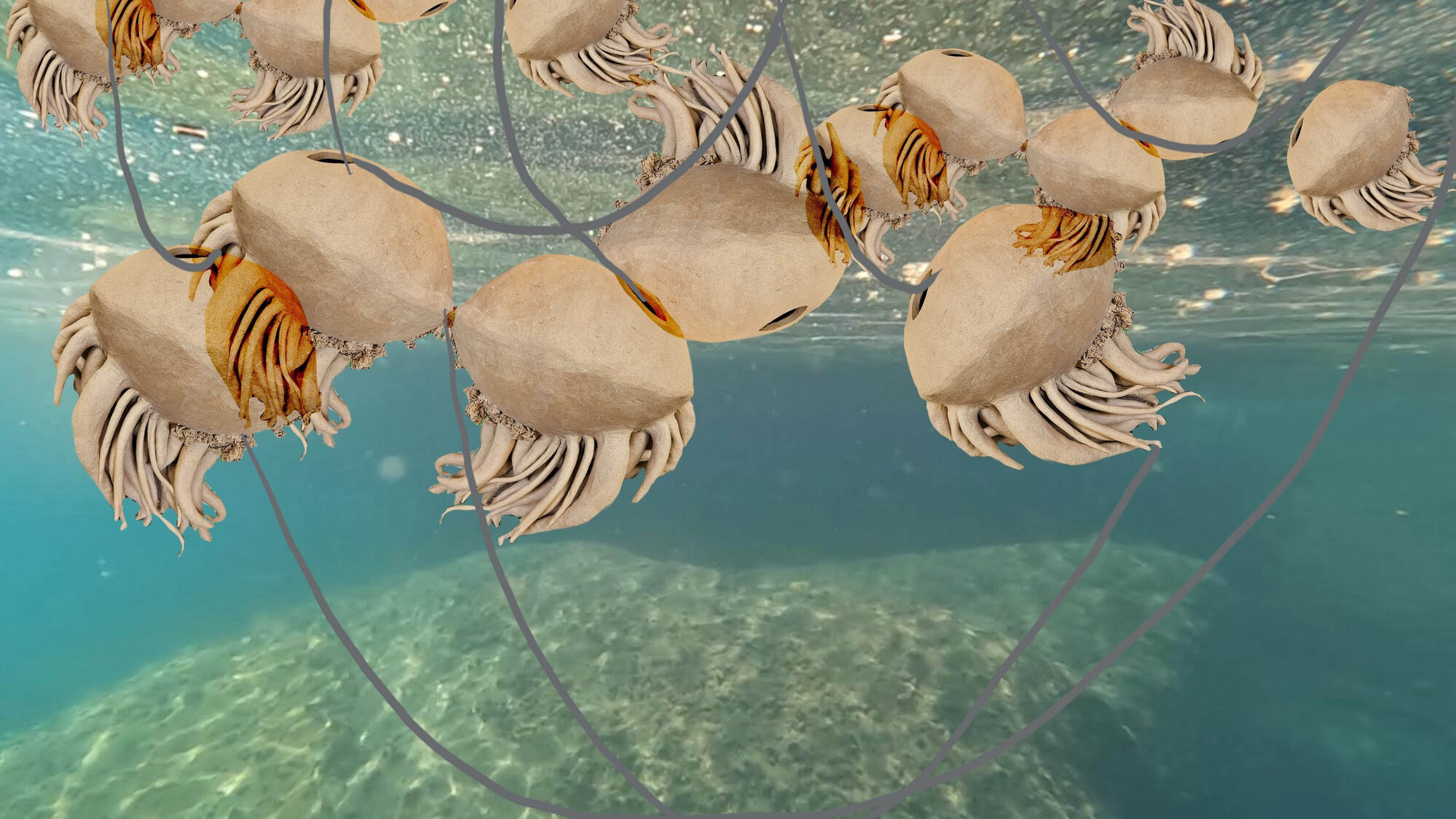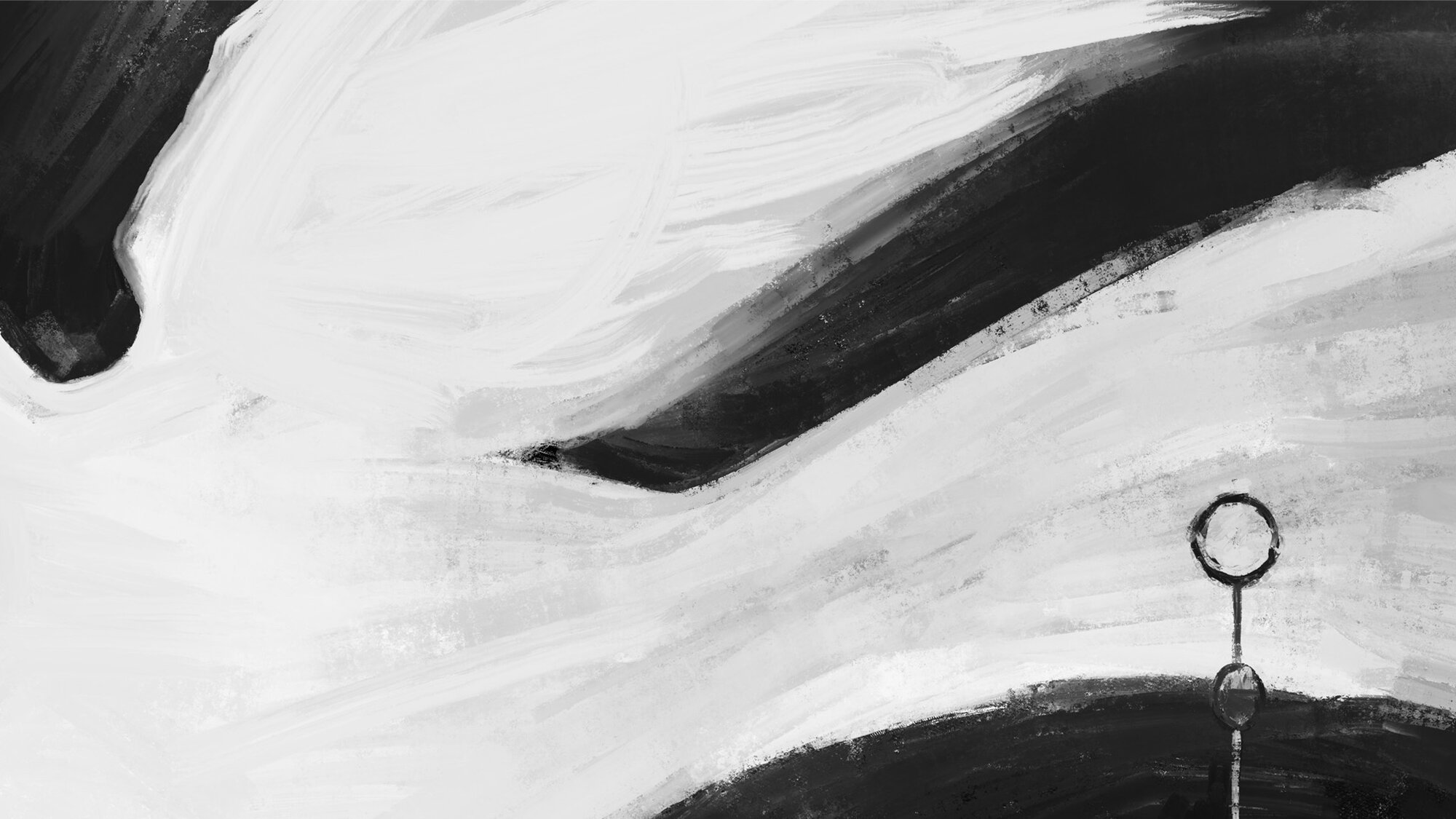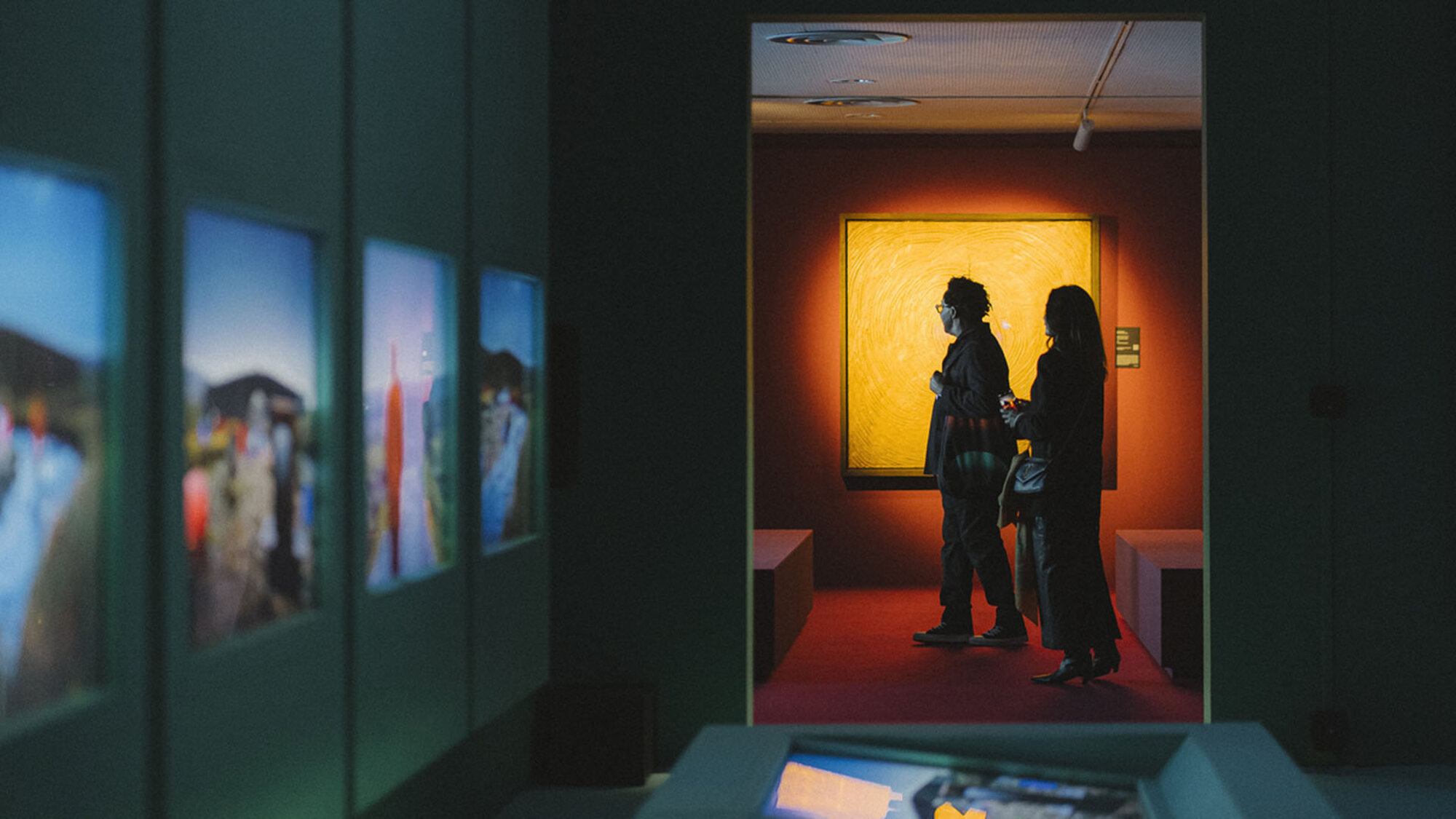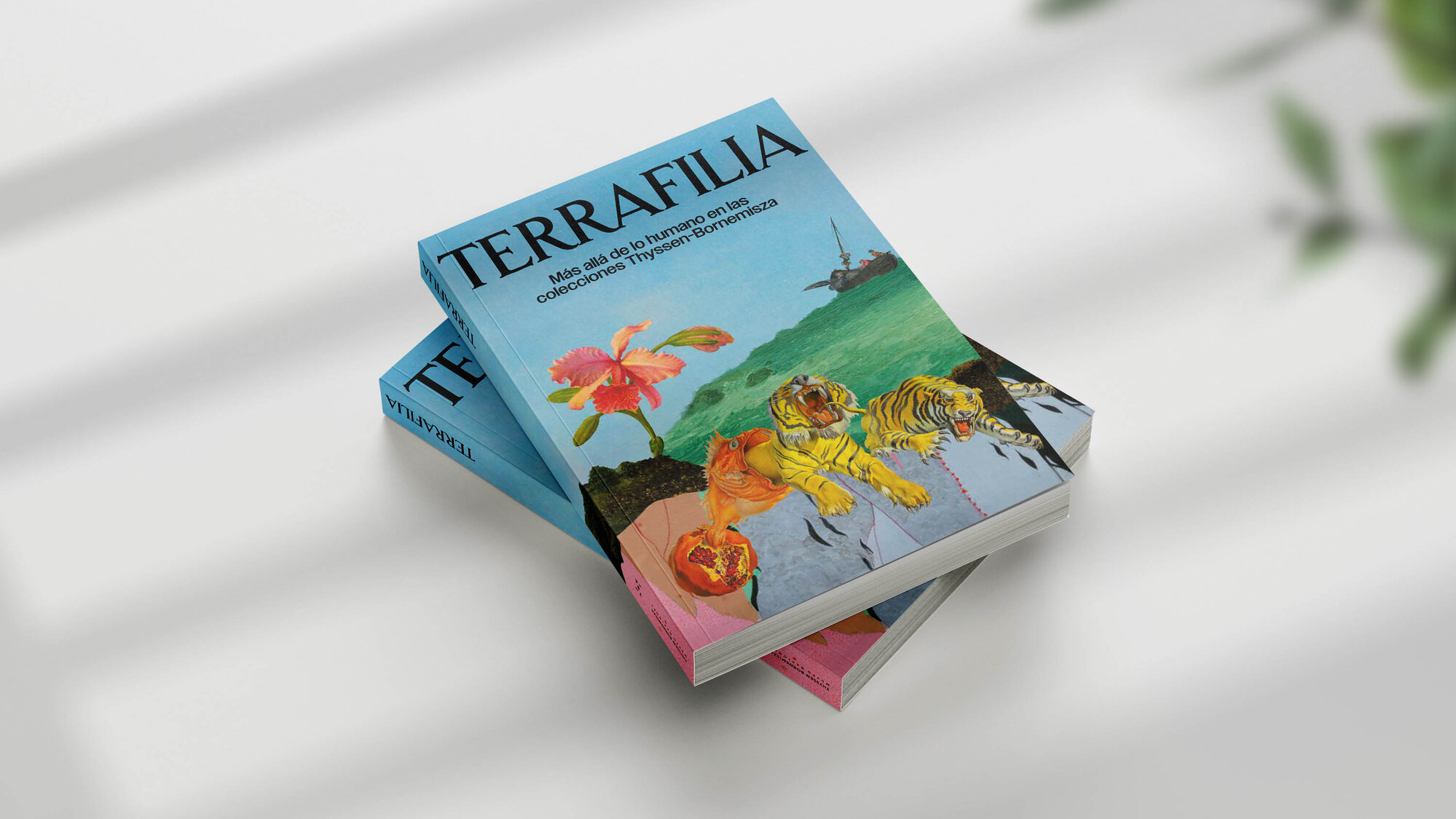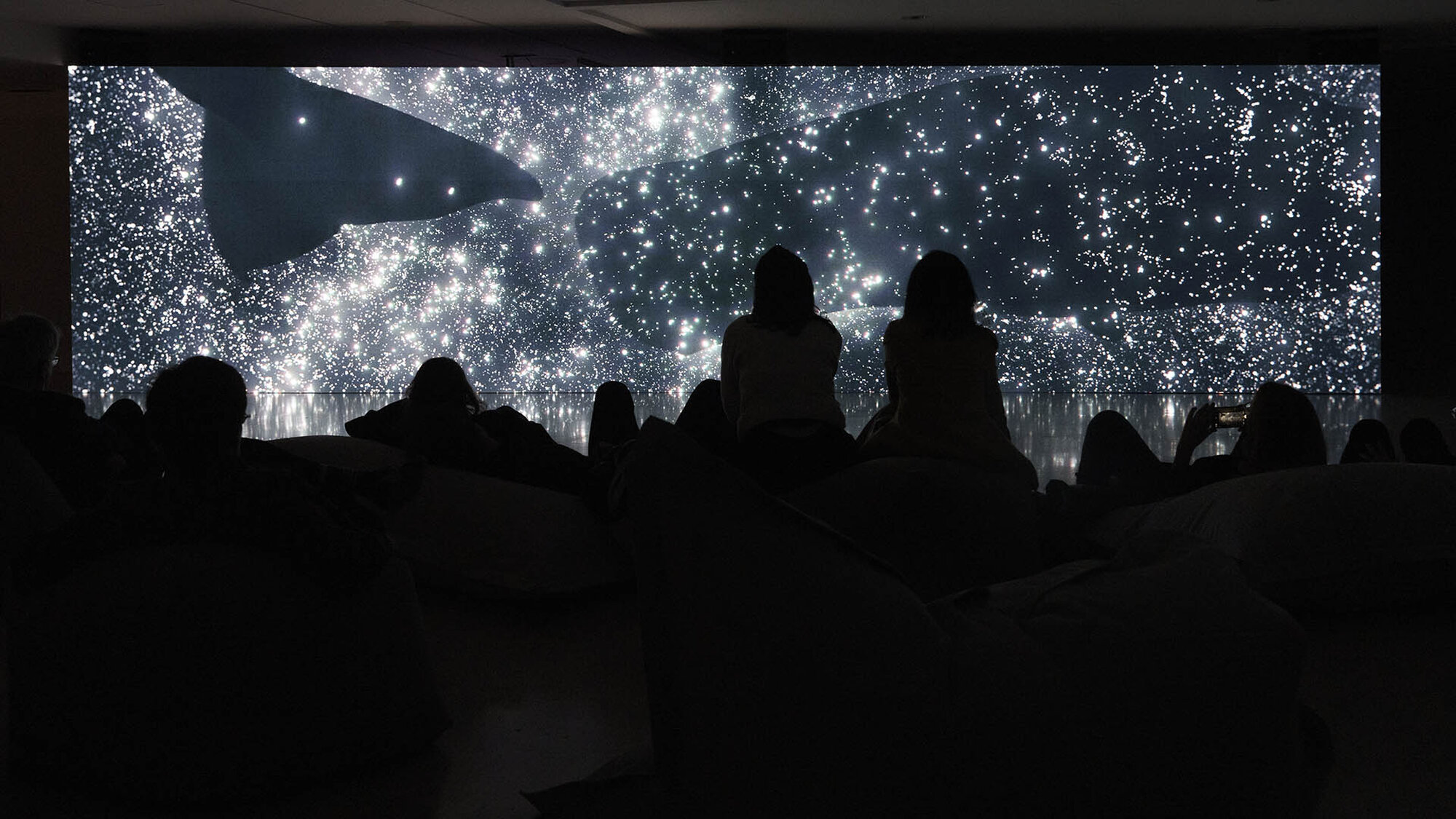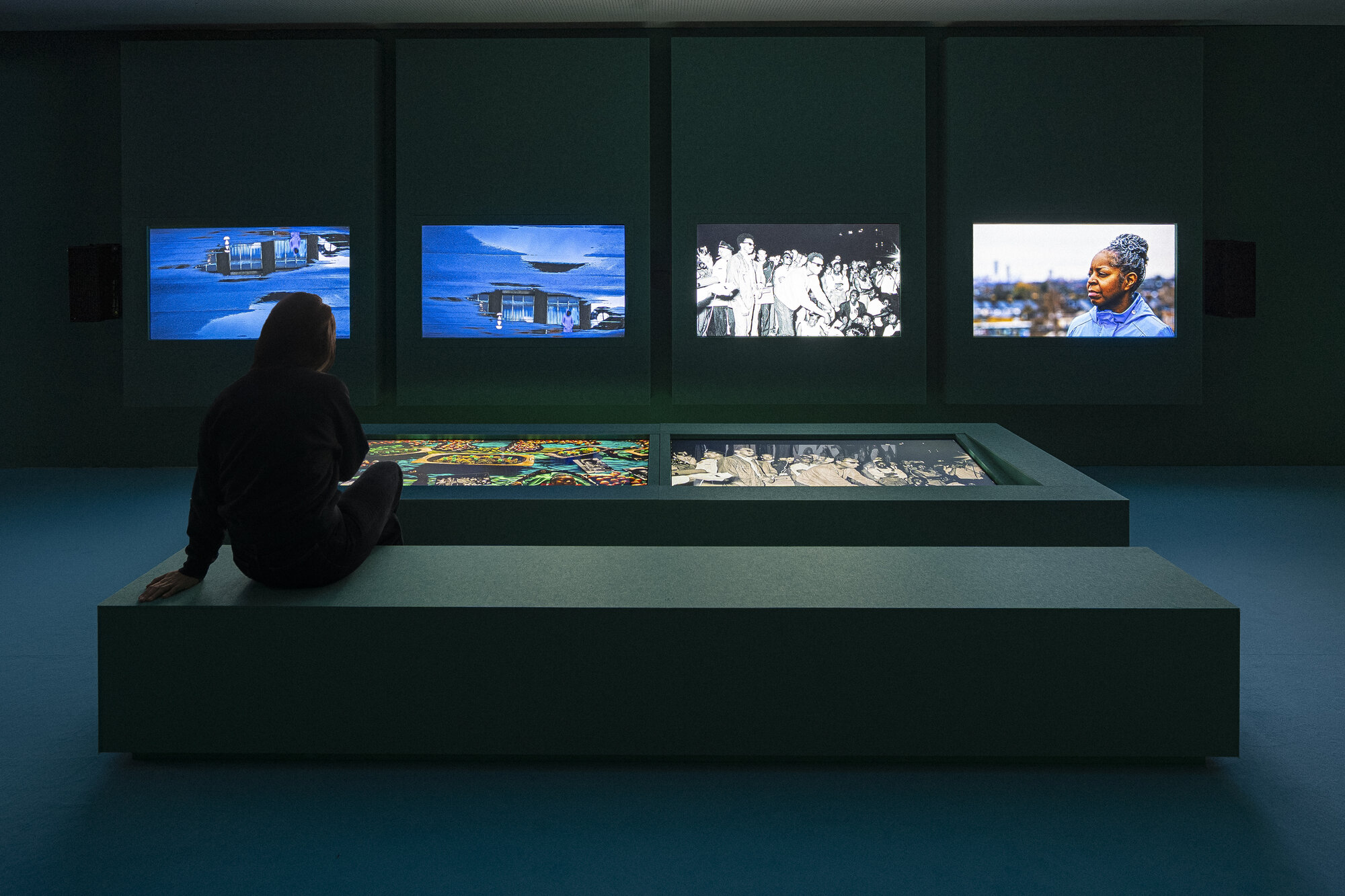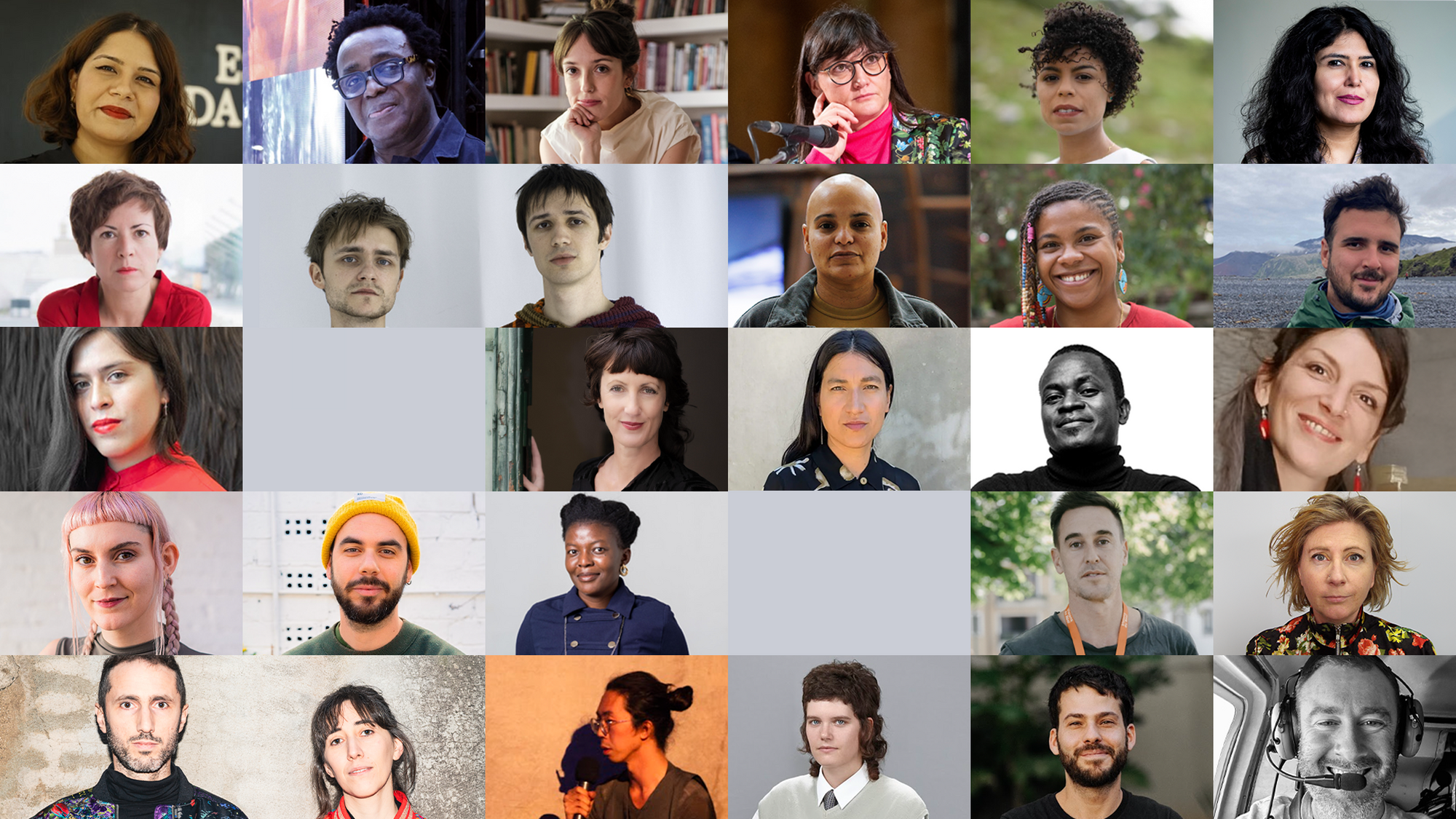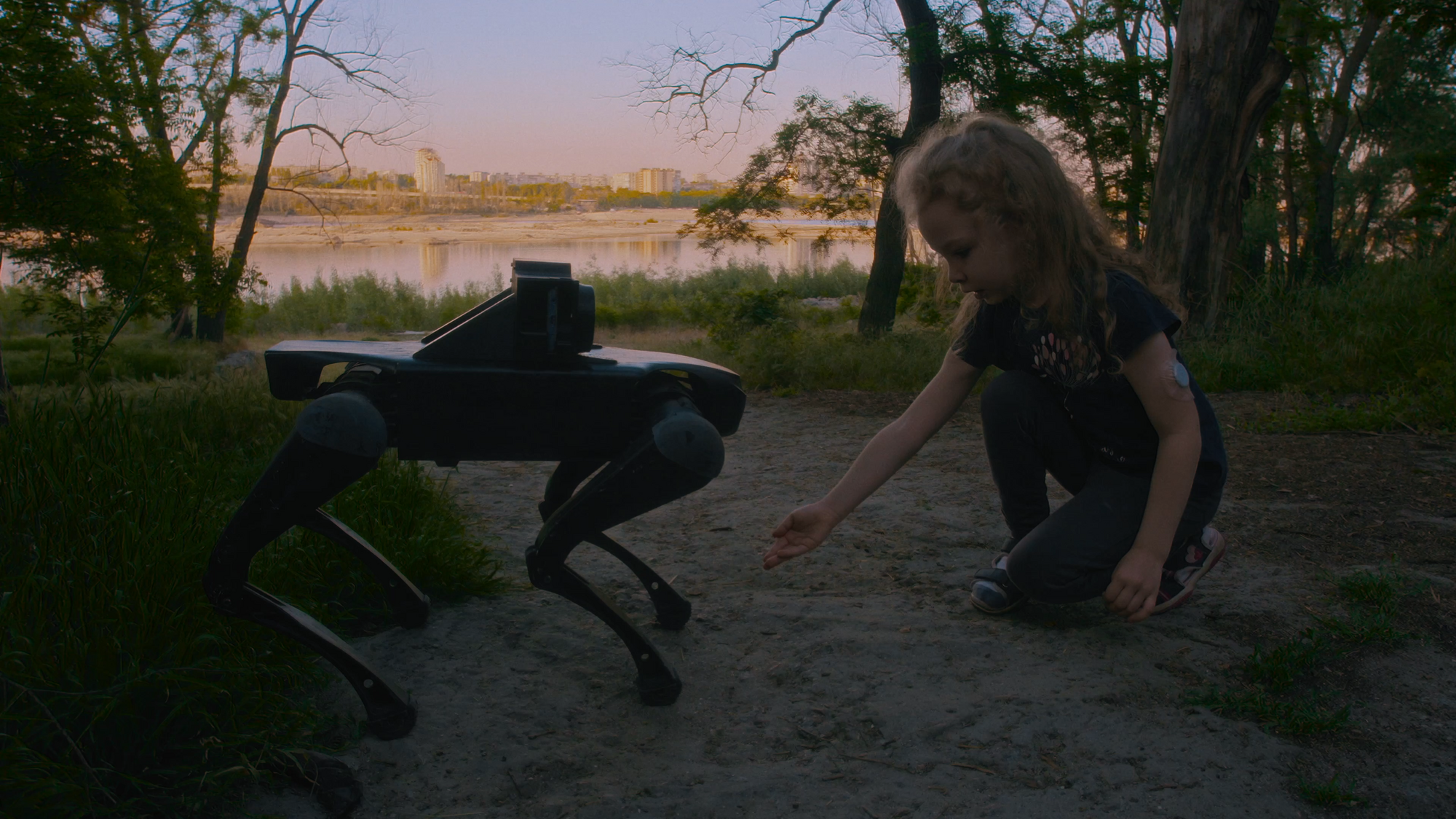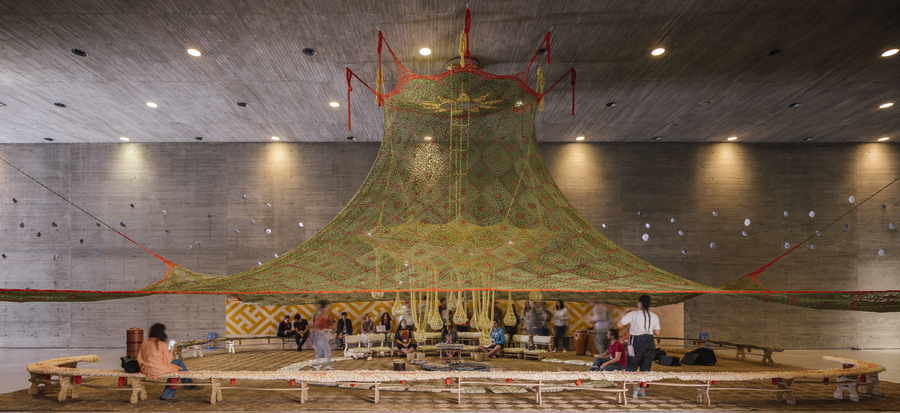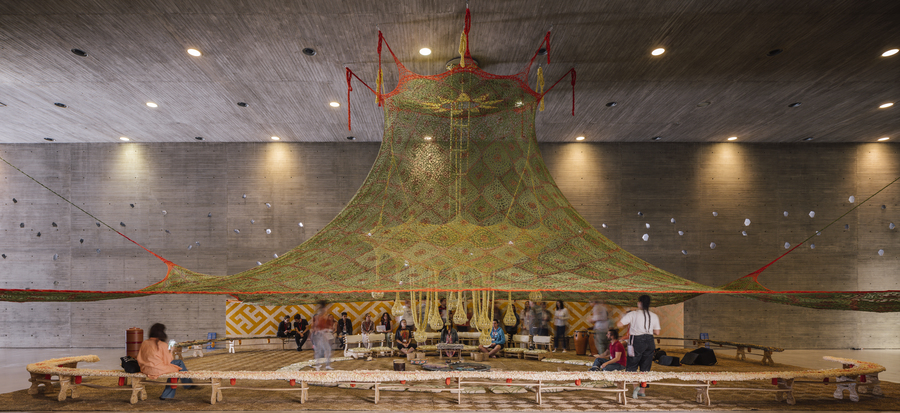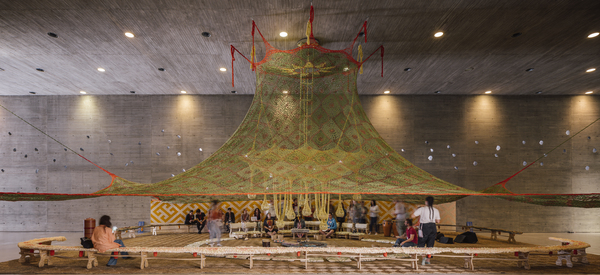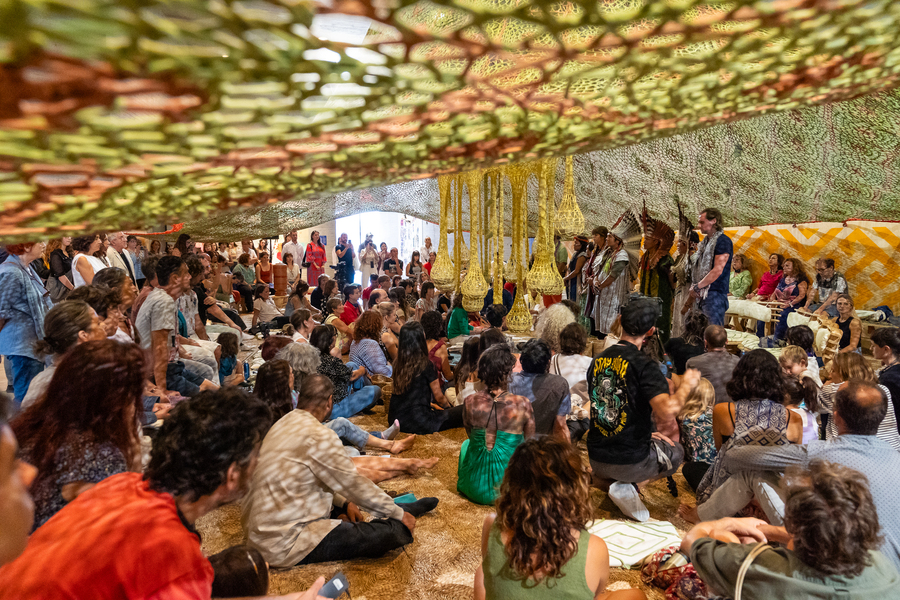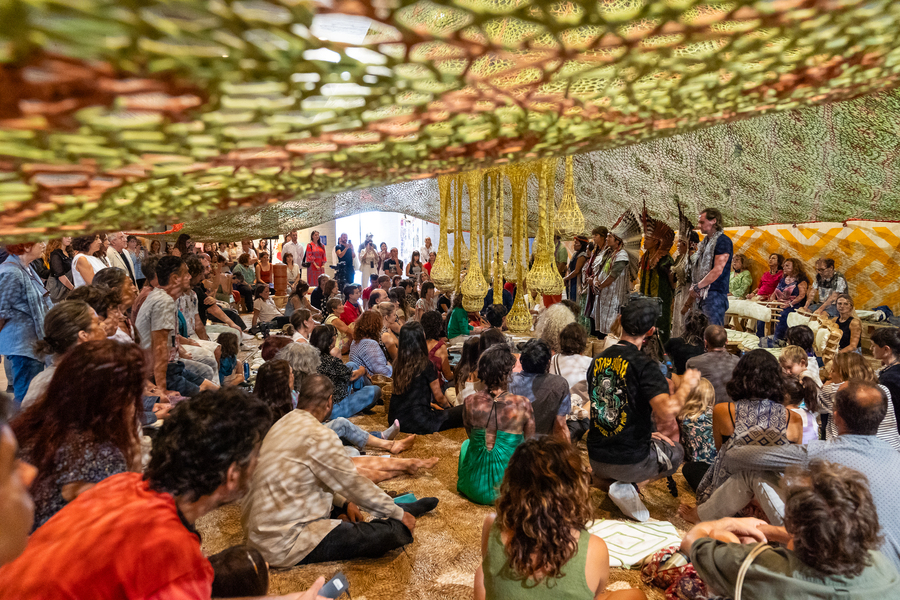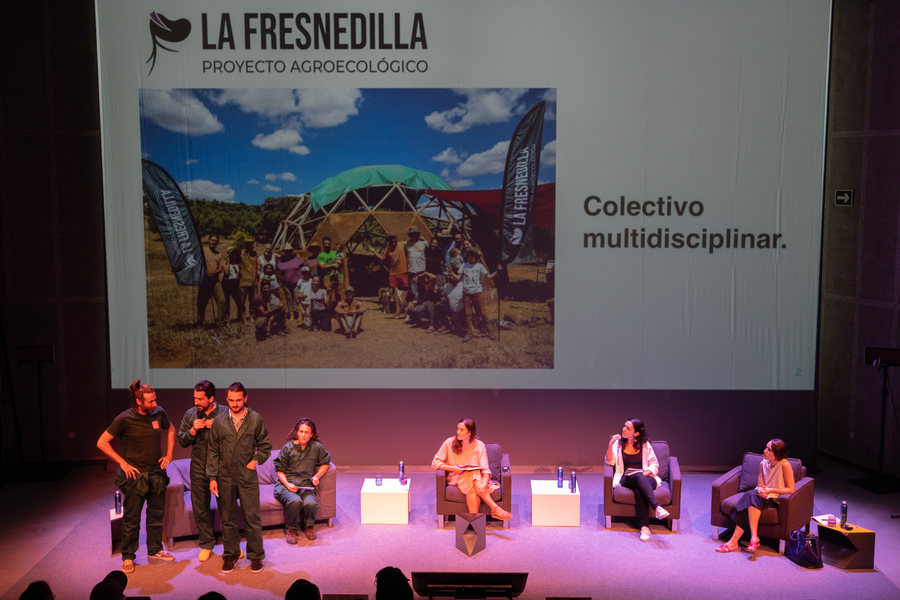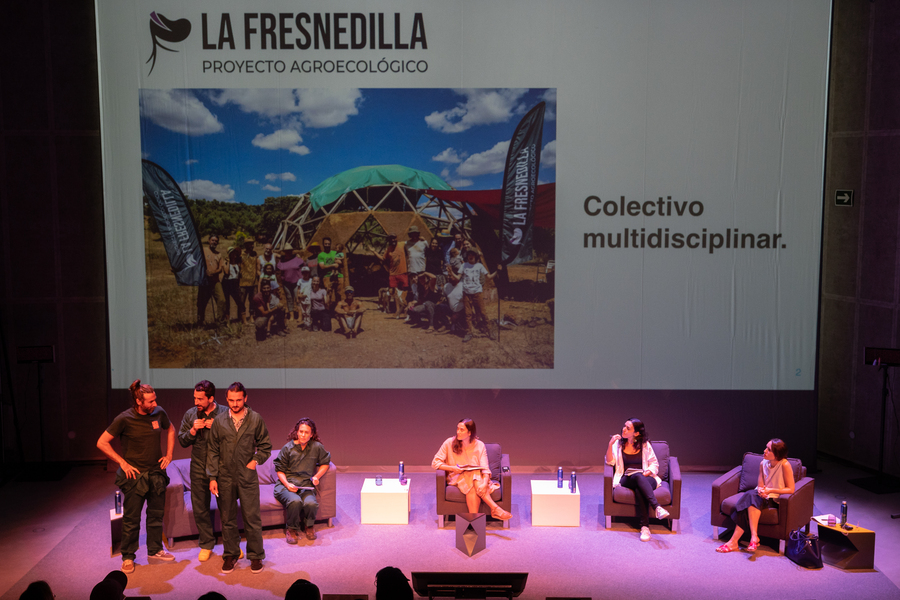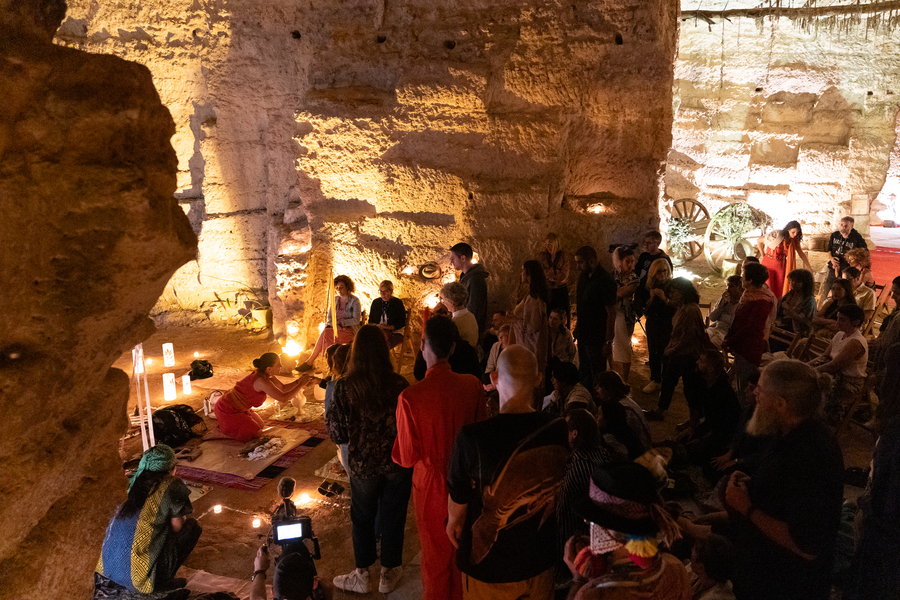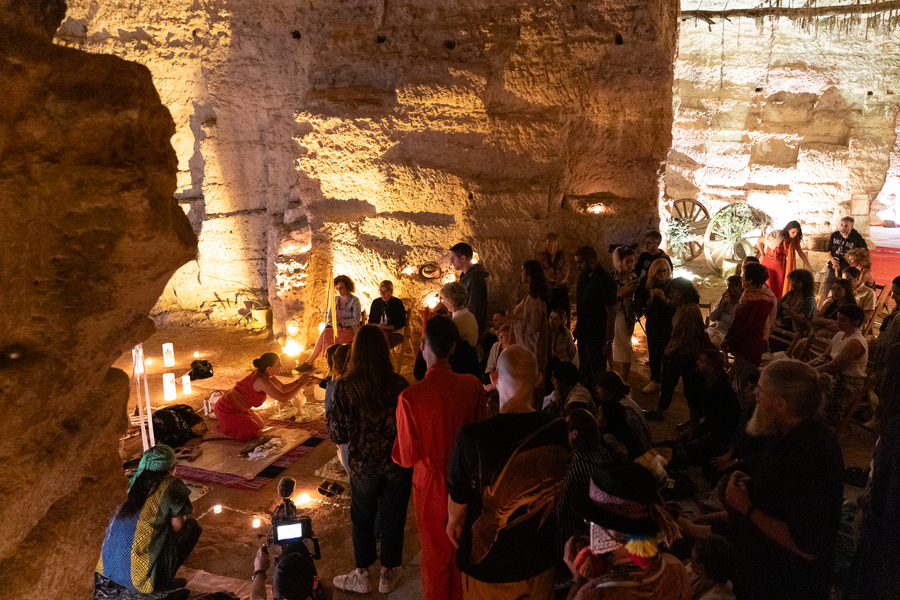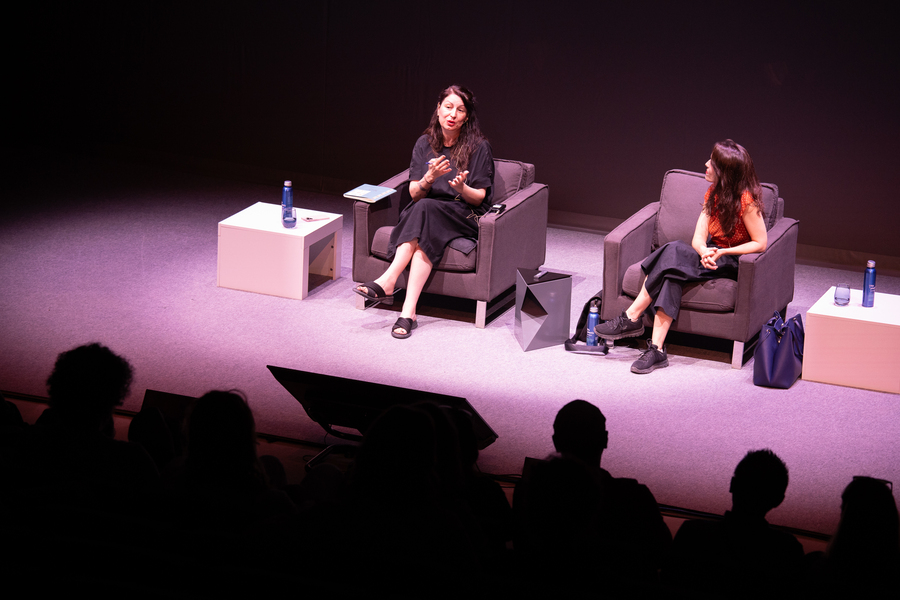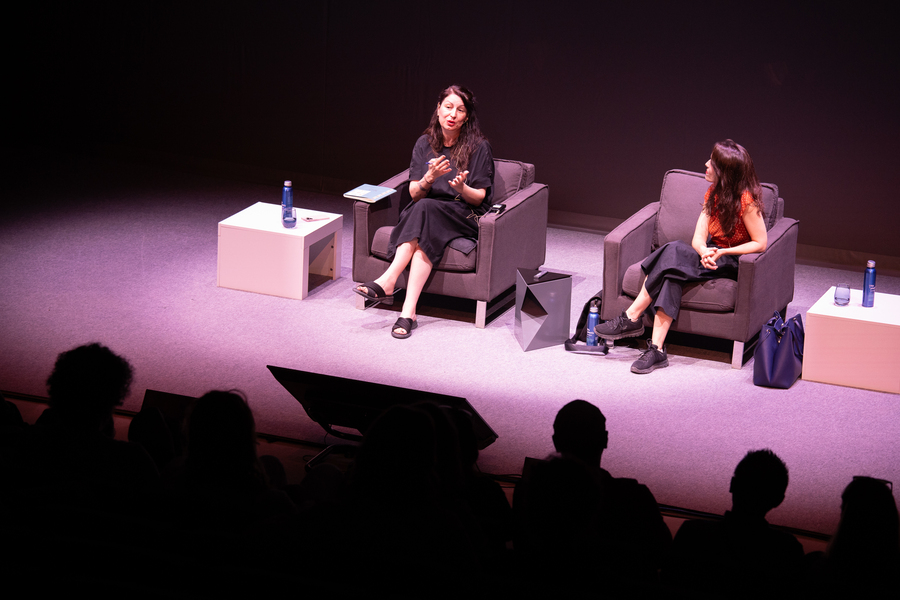“This new thinking has its origins in the old thinking. It came from our ancestors. So the
strengths also come from the strengths that are being created now; I see this with art creation,
with singing, with dancing, with healing with plants, with prayer, and also with technologies. So
all is being integrated” —Txana Bane
TBA21’s exhibition “Remedios” opened on September 22, 2023, under the title “Directions to the
Old Ways” at C3A Centro de Creación Contemporánea de Andalucía. Presenting a new
selection of works by artists including Etel Adnan, Fengyi Guo, Taloi Havini, Brad Kahlhamer,
Regina de Miguel, Pierre Mukeba, Eduardo Navarro, Paulo Nazareth, Selma Selman, Himali
Singh Soin, and Akeem Smith with Jessi Reaves, the exhibition, curated by Daniela Zyman,
encourages a pluriversal and immersive exploration of practices of reparation, restitution, and
transformative care.
Simultaneously, a three-day gathering entitled “The Art of Reparation”
unfoldes the political, spiritual, and transformative ambitions of the project between Sep 22 and Sep 24, 2023. Conceived as a platform for dialogue, discussion, and curative practice, it weaved together diverse voices, cultures, and engagements in pursuit of a collective journey toward renewal and repair.
The highlight of “The Art of Reparation” was the ceremonial opening of “Remedios: Directions to
the Old Ways” by acclaimed artist Ernesto Neto and a delegation of Amazonian Huni Kuin
leaders and shamans. The opening ceremony featured captivating songs and dances,
showcasing the healing practices and the ancestral knowledge of the Huni Kuin people. The
ceremony was set to create a space of encounter, deep listening, and healing within the inspiring
setting of Neto’s Kupixawa (traditional gathering space) at C3A.
Saturday’s program focused on “Healing the Land,” exploring themes of sustainable
custodianship, redistributive agrarian practices, and the recovery of traditional knowledge and
practices. The artist Asunción Molinos Gordo, who is featured in the “Remedios” exhibition, was joined by Helena Moreno González, and members of La Fresnedilla, proyecto agroecológico
to provide their insights on ecocentric ethics in contemporary farming. In the afternoon,
“Healing Universes” explored the Huni Kuin concept of Novo Tempo (Xina Bena), a time
defined by the Huni Kuin’s engagement with the world outside their forest, intertwining
perspectives on plant knowledge and therapeutic practices, encapsulated by the concept of
“ancestral futures.” Xina Bena called for a renewed engagement with and contribution to the
world at large, a time of exchange, and a striving for Indigenous self-governance and
sovereignty. The day closed with a talk by the Huni Kuin pajés centered around “Teacher plants”
in dialogue with a ritualistic encounter organized by artistic collective PLATA and Pilar Amor, and
a culinary degustation of local products offered by La Fresnedilla, proyecto agroecológico.
The third day, titled “Healing the Memory,” presented Regina de Miguel's research project,
"Nekya: A film river" (2023), delving into the historical, critical, and poetic aspects of the Riotinto
region in Huelva, Spain. A conversation with forensic archeologist Juan Manuel Guijo addressed the rights of victims during the Spanish Civil War and Franco’s dictatorship. The
historian Javier García Fernández examined the concept “internal colonialism” by discussing
social struggles in rural Andalucía and the decolonization of Eurocentric narratives.
Friday, September 22
CEREMONIAL OPENING
“Remedios: Directions to the Old Ways”
C3A Centro de Creación Contemporánea de Andalucía
6:30–9:00 pm
Ceremonial opening by Ernesto Neto and the Huni Kuin
With Living Bridge - The union of Western and Indigenous culture based in Europe, leaders of
the Amazonian Huni Kuin people, and Ernesto Neto.
Kupixawa, C3A Centro de Creación Contemporánea de Andalucía
In English and Portuguese, with Spanish translations
“Singing is the forest, there is a forest inside us.” —Ernesto Neto
Pajé (shaman) Txana Bane of the Indigenous Huni Kuin people inaugurate the three-day
gathering with a ceremony of songs and dances. Joined by Pae Ibu, Kathy Makuani, Siá,
Shimpani, Nawa Ibà, and Ernesto Neto, the opening ritual serves to create a zone of encounter,
deep listening, and healing under Neto’s Kupixawa installation. Neto’s colorful crochet
sanctuary welcomes diverse voices, to share their cosmovisions and practices, inviting
ancestors and other-than-human agencies in and around us.
Saturday, September 23
HEALING THE LAND
C3A Centro de Creación Contemporánea de Andalucía and Cuevas del Pino
11:30–1:30 am
Is the Land for Those Who Work It?
Roundtable with Asunción Molinos Gordo, Helena Moreno González, and La Fresnedilla,
proyecto agroecológico. Moderated by Marina Avia Estrada
Caja Negra, C3A Centro de Creación Contemporánea de Andalucía
In Spanish
“To call something a resource is to make certain claims about it.”
–Elizabeth Emma Ferry and Mandana E. Limbert
In this talk, Asunción Molinos Gordo, Helena Moreno González, and members of La Fresnedilla,
proyecto agroecológico, address and dismantle the misleading narrative that propagates a
worldwide shortage of resources. Drawing on their respective artistic and agricultural practices,
they address the issue of ecologically fair distribution and offer inspiring approaches rooted in
the revival of traditional knowledge, heritage, and the wisdom of peasants.
5:30–7:00 pm
Healing Universes
With Living Bridge, leaders of the Amazonian Huni Kuin people, and Ernesto Neto. Moderated
by Daniela Zyman
Kupixawa, C3A Centro de Creación Contemporánea de Andalucía
In English, Portuguese, and Spanish
With the concept of Xina Bena, which means “New Time” in Hatxakui, the Huni Kuin people
signal a transformative process that spans multiple dimensions. This emerging era calls for the
establishment of collaborative, old and new learning methods, fostering connections not only
between different communities and worldmaking technologies, but also between humans and
nonhuman entities. It signifies a profound shift in perspectives and approaches towards
coexistence with the natural world and each other. This gathering provides a unique opportunity
for conversations that bridge geographic, artistic, and spiritual boundaries.
20:00–23:00 pm
Plantas Maestras and Traditional Gastronomy
Talk followed by a ritual gathering and culinary celebration
With PLATA and Pilar Amor, Amerindian healers and knowledge keepers Txana Bane, Pae Ibu,
Kathy Makuani, Siá, Shimpani, Nawa Ibà, Ernesto Neto, and La Fresnedilla, proyecto
agroecológico.
Cuevas del Pino (transfer from C3A at 19:30)
In English, Portuguese, and Spanish
Traditional Amazonian Teacher Plants are not merely passive substances; they are sentient
spiritual entities with their own agency. These plantas maestras (Teacher Plants) facilitate a
profound connection between humans and various forest beings, activating different states of
consciousness, intentionality, and subjectivity. For the Huni Kuin people, these plants are
revered guides, leading them into the practical, therapeutic, and spiritual dimensions of their
existence. Furthermore, plants are reparative and transformative, digesting and metabolizing the
toxic disorders of climatic, emotional, and somatic dysfunction. In dialogue with Pilar Amor and
the artistic collective PLATA, and joined by the collective La Fresnedilla, proyecto agroecológico,
this encounter culminates in a culinary offering to celebrate the importance of preserving
traditional foodways.
Sunday, September 24
HEALING THE MEMORY
Caja Negra, C3A Centro de Creación Contemporánea de Andalucía
11:30 am –12:00 pm
Nekya: A film river
Presentation of the research project by Regina de Miguel
In Spanish
Commissioned for “Remedios,” Regina de Miguel’s essay film Nekya: A film river (2023)
undertakes a historical, critical, and poetic investigation of Riotinto, a region located in the
province of Huelva in Southern Spain. In her presentation de Miguel elaborates on the working
methodologies and the manyfold layers involved in this project. Unique from a geological and
biological perspective, this region has witnessed processes of colonization and exploitation and
poses a singular paradigm that queries the beginning of life in the universe. The film conjoins a
reflection on geological and lithic temporalities with the history of ecological disasters and
social turbulence. From the massacre of over 200 miners who went on strike against the
British-owned Rio Tinto Company in the late nineteenth century to the crimes and mass graves
during Franco’s dictatorship, the Riotinto Basin has become emblematic of the debate around
the political construction of past, present, and future memories.
12:00 –1:00 pm
Riotinto: Memories in Construction
A conversation with Regina de Miguel and Juan Manuel Guijo. Moderated by Marina Avia
Estrada
In Spanish
In a conversation with forensic archaeologist Juan Manuel Guijo, Regina de Miguel addresses
the ongoing debate around Spanish democratic memory, specifically addressing the rights of
the victims of the Spanish Civil War and the ensuing Francoist dictatorship. With this context in
mind, the talk focuses on the role of forensic archaeology in unearthing the memory of the
victims and the exhumation of mass graves as an act of rescuing the disappeared from the
silence of oblivion, fostering a collective democratic memory.
1:00 – 2:00 pm
Riotinto: Epistemologies of Internal Colonialism
A talk by Javier García Fernández
In Spanish
Javier García Fernández, a historian specialising in the social struggles of rural Andalusia,
presents the Spanish South as a paradigmatic example of what he calls “internal colonialism.”
Understanding Andalusia as a borderland in between the Atlantic and the Mediterranean;
Europe, Africa and America; East and West; North and South, implies decolonising the
Eurocentric narratives that have shaped hegemonic ways of thinking about Andalusia. Through
the lens of Riotinto and Huelva —described as places relegated to a peripheral position—,
García Fernández delves into the social, economic, and epistemological questions raised by this
territory. The talk traces histories of resistance against exploitative economies and predatory
violence, shedding light on new forms of trade unionism that embrace ecological justice and
foster a path toward a democratic collective memory.




























